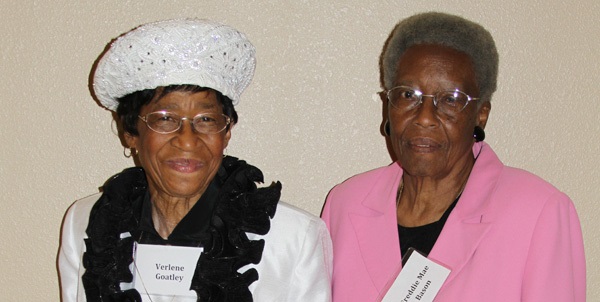By Daniel Wallace
Baylor University’s School of Social Work recently recognized two daughters of the segregated South who served as forerunners for change and equality when they broke the color barrier at the Carver School of Missions and Social Work in Louisville, Ky., in 1955.
Freddie Mae Bason and Verlene Farmer Goatley recalled their story at a Baylor School of Social Work board of advocates meeting and were honored during a worship service that evening.
 Guy Bellamy, who directed the department of work with National Baptists for the Southern Baptist Home Mission Board, recruited the two African-American women to desegregate Carver in 1955. This came on the heels of the U.S. Supreme Court’s Brown v. Board of Education ruling in 1954, which declared racial segregation in public schools unconstitutional.
Guy Bellamy, who directed the department of work with National Baptists for the Southern Baptist Home Mission Board, recruited the two African-American women to desegregate Carver in 1955. This came on the heels of the U.S. Supreme Court’s Brown v. Board of Education ruling in 1954, which declared racial segregation in public schools unconstitutional.
The women, both members of the National Baptist Convention’s Women’s Auxiliary, were aware of the social ramifications of integrating an all-white private school and felt honored by the invitation. Bason took the challenge head-on with little fear.
“I did not feel intimidated. I felt no danger,” she said. “For me, God was taking care of me.”
Goatley was pleasantly surprised at the warm hospitality shown by fellow classmates and grateful for God’s provision throughout her time at the Carver School.
“I was just thankful some of the stories I had heard were not true when we got there,” she said. “We just saw God taking care of us wherever we went.”
Carver students played a pivotal role in helping Bason and Goatley adjust to the challenges of being the only African-Americans in an otherwise all-white student body.
“They always went out of their way to let us know we were welcome here,” Bason said. “Some were from the Deep South and really prejudiced, but the others made up for it and said this is the way it was supposed to be.”
The two women followed strikingly similar paths to the Carver School. Both women grew up in Oklahoma and attended Langston University and the Oklahoma School of Religion before attending the school then associated with Southern Baptist Theological Seminary.
Goatley became interested in missions as a child and dedicated her life to serving others from an early age. Bason had a similar heart but didn’t find her place in Christian ministry until the Carver School.
“I always wanted to help people,” she said. “All I ever saw was white women doing it, (but) God opened that door to help somebody every single day.”
For Goatley, the Carver School experience marked the beginning of a life devoted to seeking God continually through prayer.
“God can do anything but fail, and I thank God for the power of prayer,” she said. “I believe any place is a place of prayer.”
Upon completion of their Carver studies, Bason and Goatley continued to break down the walls of racial segregation as African-American women in church leadership.
Goatley’s journey took her to Liberia for seven years, where she served as a missionary, and then back to Langston University, where she taught religious education classes 25 years.
After the Carver School, Bason worked with the SBC Home Mission Board where she did what she always had dreamed of doing — helping people. She spent her career providing after-school and family programs to low-income children and families in the Atlanta area.
The Baylor School of Social Work honored Bason and Goatley as trailblazers in Christian social work at a worship service that featured music by the Baylor Men’s Choir and a sermon by Bill Lawson, retired founding pastor of Wheeler Avenue Baptist Church in Houston.
Lawson, who serves on the Baylor School of Social Work board of advocates, challenged social work students to view their studies and future service as a divine calling of God, rather than just another career. He urged them not to view social work as a “kneejerk reaction to social injustice,” but as a high calling grounded in the gospel of Jesus Christ.
“At its worst, social work is a charity (or) a profession” he said. “At its best, social work is not a profession. It’s a calling of Jesus Christ to look at the weak of the world as Jesus himself.”
